[Ozark Softscape, Atari]

The things requested and that Your Highnesses give and grant to Don Cristóbal de Colón in some satisfaction of what he has discovered in the oceanic seas and of the journey that now with the help of God he has to make for them in the service of Your Highnesses are those that are followed: […]
Firstly, that Your Highnesses, as Lords who are of the said oceanic seas, make from now on the said Don Cristóbal de Colón your admiral in all those islands and solid lands that by your hand or industry will be discovered or gained in the said oceanic seas for during his life and, after his death, to his heirs and successors from one to another perpetually […]
Item, that of all and any merchandise, even pearls, precious stones, gold, silver, spices and any other things and merchandise of any kind, name and manner that are purchased, exchanged, found, earned and contained in the limits of the said admiralty, which from now on Your Highnesses show favor to the said Don Cristóbal and want him to have and take for himself a tenth of all of it, removing all the costs incurred in it, so that what remains clean and free and take the said tenth part for himself and do with it at his will, leaving the other nine parts for Your Highnesses […]
Capitulaciones de Santa Fe, 17th of April 1492
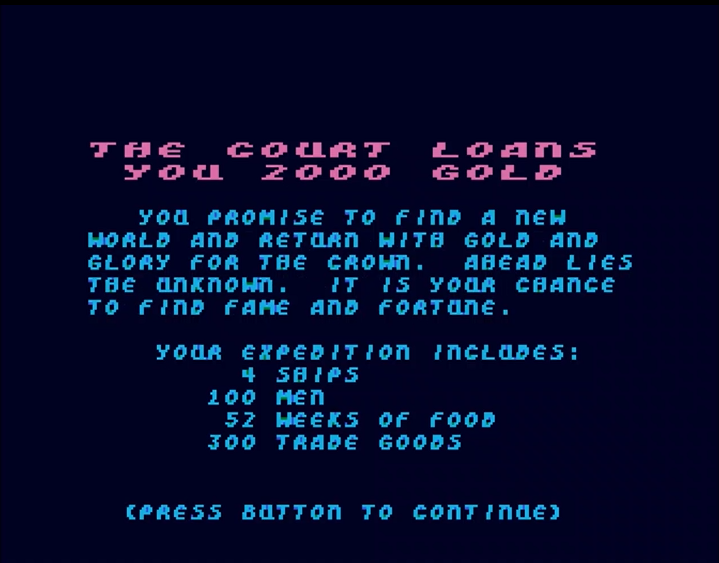
In the year of our Lord 1492, by the grace of Their Catholic Majesties, I have been vested with the noble charge to discover a new passage to the affluent realms of Asia. The Portuguese, ever cunning, have seized the southern routes for their own gain, so we must find a path through the Ocean Sea.
My preparations have been thorough. Though some advisors, lacking in foresight, have claimed the distance to the fabled Cipango to be far greater than my calculations suggest, I stand firm in my estimations, backed by the wisdom of Marinus of Tyre, more ancient than their Ptolemy, which is an incontrovertible proof of his correctness, Quod erat demonstrandum.
On this auspicious day in March, we set sail with four proud vessels: the Niña, the Pinta, the Estrella, and our flagship, the Santa Maria.
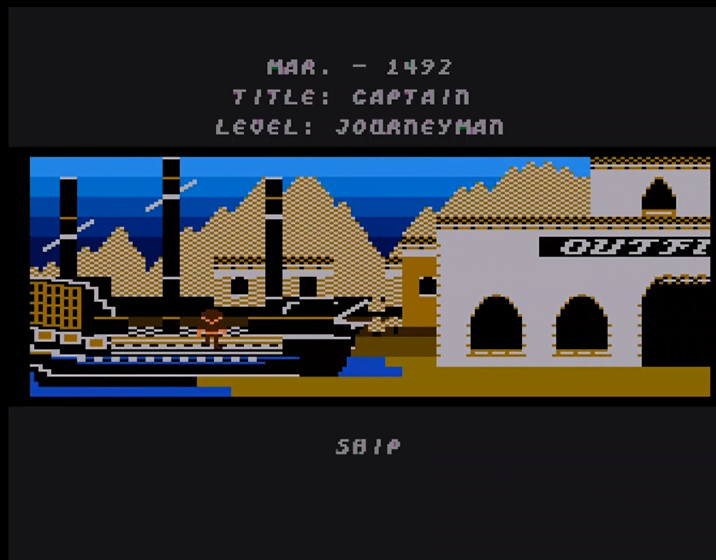
After navigating the boundless ocean for a month…
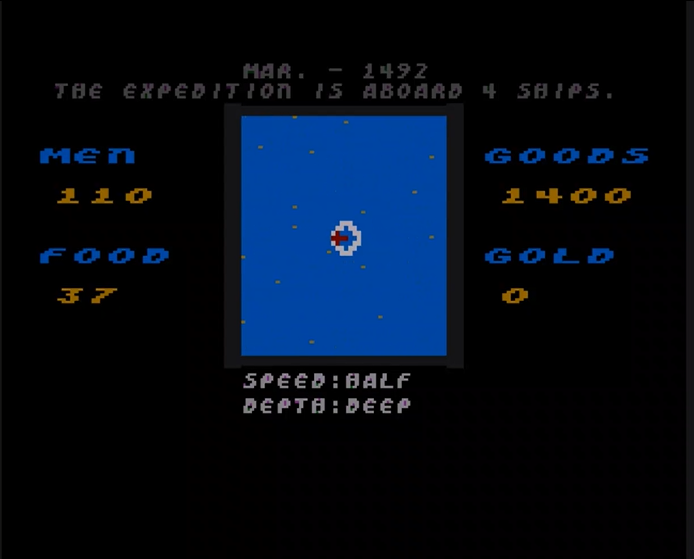
…our perseverance bore fruit—land was sighted. A jubilant cry of “Land! LAND!” echoed across the sea. There it was—the very shores of Cipango, precisely as I had predicted.

We sailed along the coastline, first northeast then north, searching for a river or inlet. The island’s considerable size confirmed it must be Cipango, and not merely one of the 7000 lesser isles described by Marco Polo, though it lay more northerly and was markedly cooler than anticipated.
From the deck, the land appears virgin and untouched by man; vast forests and plains stretch out, devoid of visible habitation. It is known that man clusters near water, and thus our next endeavour is to find a river, where surely I shall encounter the people of this mysterious land.
Upon the northern turn of the coastline, a river at last reveals itself, which I appro… Ahi! there goes the Estrella taking with her a full quarter of our provisions, goods, and brave men.

Bartolomé, pray expunge from the records any mention of the Estrella. Let history remember that I set forth from the shores of Spain with but three ships!

Alas, even after days of following the river’s course, I don’t find any sign of civilization.
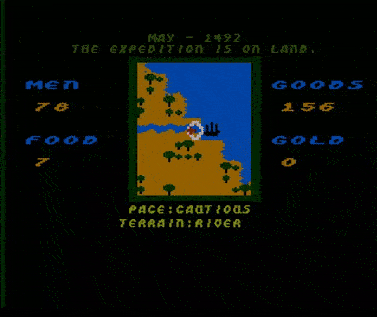
Undeterred, I returned to replenish our supplies, then ventured deeper into the island’s interior. Just as despair and scarcity began to grip us, fortune smiled—a peculiar edifice loomed on the horizon, marking our first encounter with the natives.
Approaching a gathering of tribal warriors, I single out the figure adorned with the most impressive headdress and gesture toward our goods: trade, maybe?

My fortune shifts dramatically as the tribal chief, whom they call a “cacique,” not only engages in trade but also bestows upon me a guide and a bearer for each of my men. These new allies enable me to spot villages during our continued explorations along the river
With renewed vigour, I explore further. As I push deeper into the continent, necessity forces me to engage with additional caciques, bartering for both sustenance and gold. My journey eventually led me to the origins of all the tributaries feeding the river we explored.
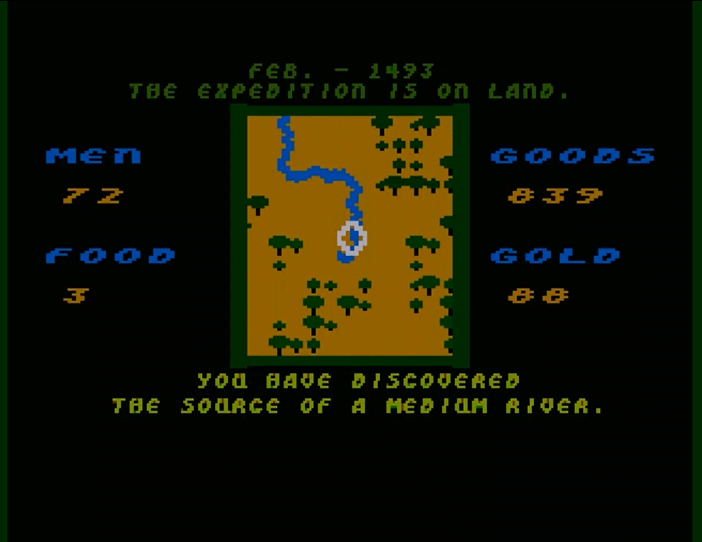
Upon further exploration around one of the river’s sources, I stumble upon a village of farmers—a new and curious sight. The villagers, either more curious or perhaps more aggressive than in previous encounters, approach me too closely. Alas, in the scuffle with my men, two Natives are accidentally slain. Employing swift sleight of hand, I manage to amaze and temporarily keep at bay the tribesmen. In the midst of chaos, as tribesmen close in from all directions, I chance upon their cacique. It seems word of my travels has preceded me, for he demands a gift before he will even speak with me. Fortunately, I am well-prepared with a variety of trinkets.

I had teetered on the brink of disaster, but ultimately it was worth it as the cacique granted me an additional bearer for each of my men, enabling us to carry more gold and provisions than ever before.
Continuing southward, I traced the river to its twin sources in the west before following the mainstem. My exploration led me to a vast lake, and as I ventured further, the terrain transformed into marshland, signaling my approach to the sea. By September of 1493, I reached the ocean again.
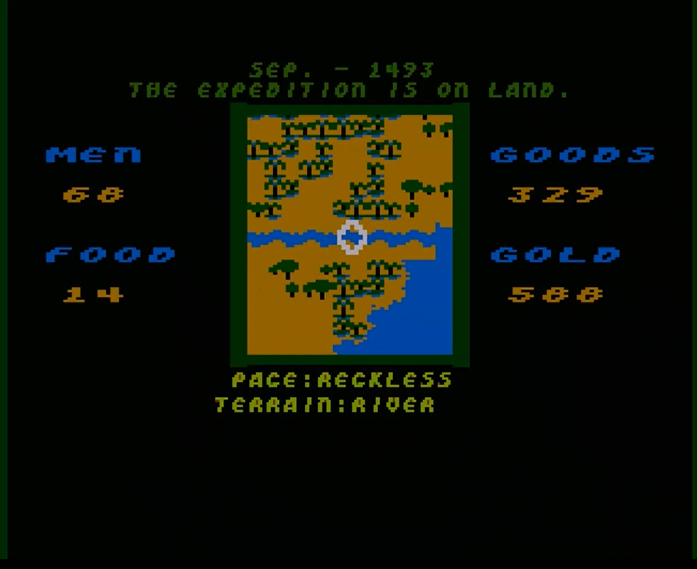
Tracing the coastline in search of my vessels, I explored yet another modest river and several villages. But upon my approach to the second of these, the air turned thick with tension as the villagers encircled us, their voices raised in aggressive shouts. Despite my attempts to pacify them with trinkets and gestures of goodwill, the situation rapidly deteriorated. Accidental violence claimed the lives of three natives, igniting a fierce onslaught from the tribe.

Outnumbered and overwhelmed, my crew soon succumbed, leaving me to contend with the advancing horde alone. With no recourse but to defend myself, I braced for a desperate stand. Facing a sea of adversaries, each moment became a struggle for survival, as I endeavoured to…
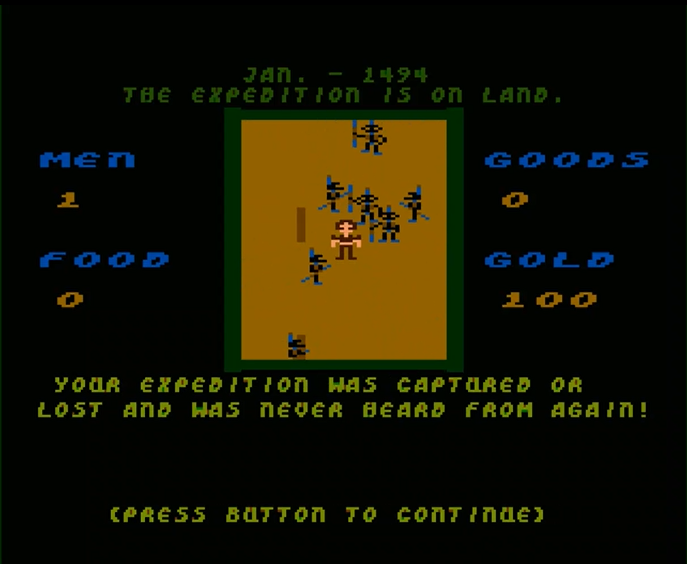
– Cosa è successo? Ande sò?
– I am afraid you have been slain, Christopher!
– Slain? But!? Who are you? Are you Saint Peter?
– No! I am Merlin. I came to save you.
– Merlin? Like Merlin from Cristiano da Troyes’s bo…?
– Yes, yes. This one. Now, if you will, I will return you to shortly before your death! Be more careful next time. I won’t save you again. I mean, probably not.
– But why…
– Listen, I WOULD have let you die, and there would have been another explorer in 1494 or something, but then he would have to start from the beginning, and I couldn’t allow that, because I had already written all my notes about you. But before you go, let me tell you that once you return to Spain, if you die, you die!
– Return? But with your power I could be the King of Cipango! I would just have to…
– No. Save-scumming. Wicked. Forbidden. Also, goodbye.
Tracing the coastline in search of my vessels, I explored yet another modest river and several villages, where the villagers were for some reason particularly eager to touch me and my men. I had to use some other of my tricks to dazzle them and approach their caciques. I also chanced upon a gold mine. Though unable to transport the precious ore, I noted its location for future endeavours.

Finally, in February 1494, freezing and nearly starved I reached the ship I had left more than one year prior. The sailors have been patient indeed.

As the supplies dwindled to a mere five days’ rations, the necessity of further trade imposed itself upon us. Hence, prior to setting our course for Spain, we engaged once more with the hunting tribes, bartering for the sustenance that would see us through the final leg of our journey on the Ocean Sea.

After securing sufficient supplies, a final detour is made to retrieve the gold from the mine previously discovered – after all, as per the Capitulaciones, it is all mine!
In June, I embark on the return trip over the Ocean Sea, reaching Spain by August of 1494

Wasting no time, I presented myself before Their Majesties, the Royal Consorts, to relay the tales of Cipango and the riches it promised. My reports were met with great enthusiasm; their pleasure was evident as they proposed yet another expedition.

The promise of further exploration beckoned, yet the need for rest was pressing. Returning home, I took a well-deserved respite, reflecting on the achievements and the knowledge gathered.
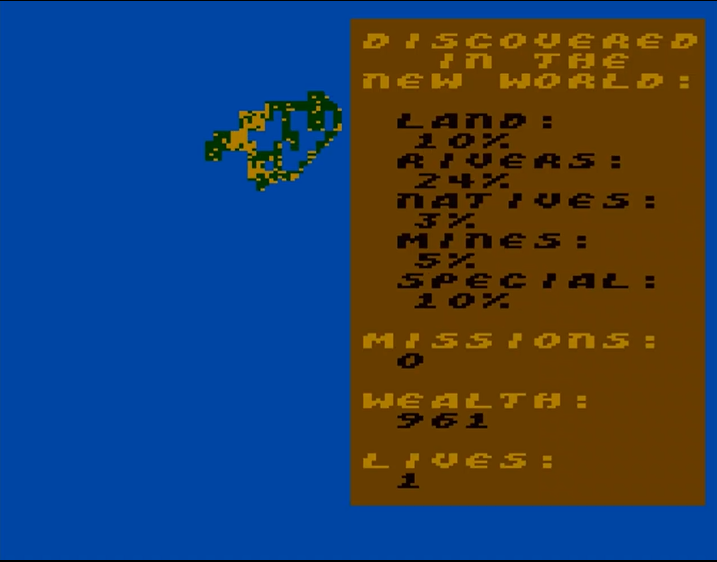
There was so much more to discover if I ever want to reach the coveted status of viceroy, but for now, let me take a little break.
This is the end of my first expedition in Dan [later Danielle] Bunten’s The Seven Cities of Gold. There will be further expeditions, and this time no reload and the AAR will end upon my death. The game allows you to carry on with a new explorer, but I won’t do that.
Kroah’s Game Reverse Engineering has covered this game, and created a cool tool allowing you to have a more detailed map of what you explored. It is not 100% accurate (there are few cells I have seen that are still displayed as black, and the other way around) but it gives a better view of what I explored:
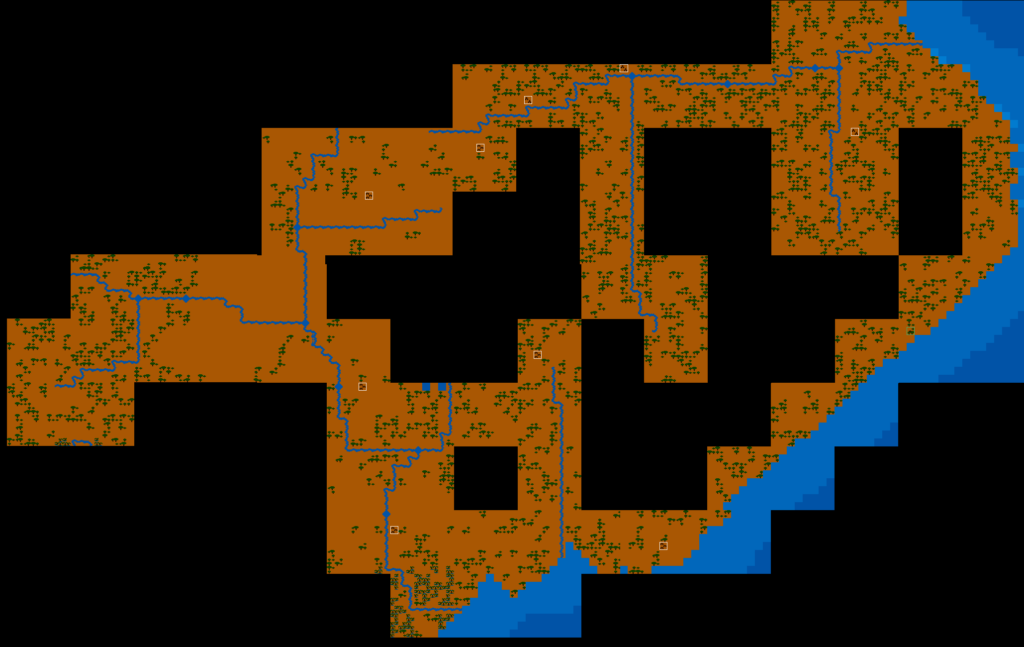
You can see the first river system I explored, and then the second river system I encountered as I explored around a source of the first one. There is still a lot to go… in the next episode, if I don’t die too early.
7 Comments
“Ande sò” left me with extreme puzzlement in how to translate it properly. I’ve always heard a lot about Seven Cities of Gold, but never bothered to play it (while I’ve played a fair bit of M.U.L.E tho!).
Also I never checked the author’s life before, Dan/Danielle Bunten went through a lot.
That was fantastic work! Looks like a great game, I love a bit of exploring and trading and sailing!
I was already excited since it’s one of the rare times you review a game of which I’ve heard about. But the re-appearance of Excalibur’s Merlin was what got me. A real stroke of genius. Looking forward to the next expeditions!
Ah, so many memories, so much time wasted in front of the Commodores with this one. It was among the earliest games we got for the computer, and it was never really retired. I still had a game going when the 128 finally died around 96 or so?
The world generator was really cool, and finding the source and mouth of a major river and all its tributaries always felt like an accomplishment. I could never seem to avoid killing villagers, even when they were peaceful…was that sluggish joystick response or my clumsy hands…? I remember the crown issuing me several warnings for brutality as the years advanced.
I keep meaning to try the re-release one day, but I’m afraid the magic wouldn’t be there, much like the remakes of Pirates! and MULE. Maybe it’s a time-and-place thing.
I played the remake of this one a lot. While that was a fine game, it always had seeming glitches that made it hard if not impossible to win. (Victory not happening despite meeting conditions, ships disappearing) Every I see this one I wonder how it managed to spawn a remake, since it handles everything far worse.
I played the Commemorative edition for one campaign. At the time I thought that it might have been a save file corruption issue, since it took a few sessions before ships, outposts, and native villages started to disappear. But once they did, it also lead me to uninstall the game quite quickly. For me it was a big disappointment, and it felt a missed opportunity to improve the original game. Can’t really recommend that edition to anyone.
Funny coincidence – I just became aware that Bunten’s first game, Wheeler Dealers, has been dumped and released in cass and woz formats. It happened September last year, but I found out about it today. It’s playable in MAME and requires 2-4 players, needs some slightly convoluted input mapping to emulate its four-button controller, and the manual is presumed lost.